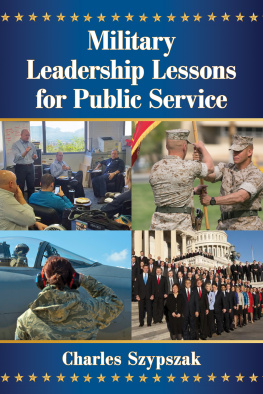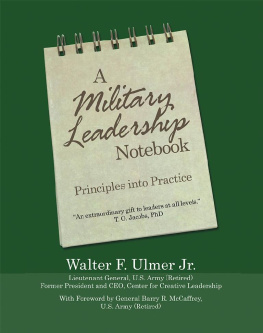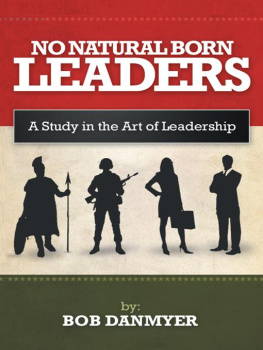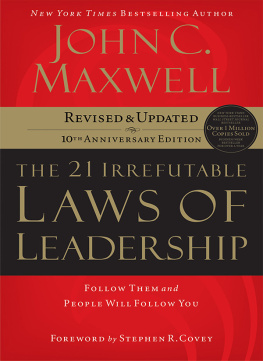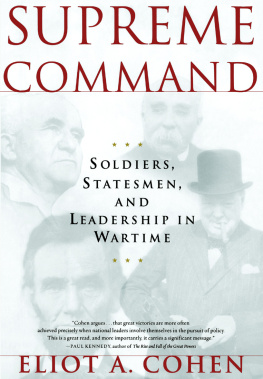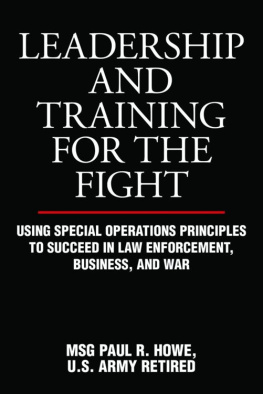
Military Leadership Lessons for Public Service
CHARLES SZYPSZAK

McFarland & Company, Inc., Publishers
Jefferson, North Carolina
e-ISBN: 978-1-4766-2703-8
LIBRARY OF CONGRESS CATALOGUING DATA ARE AVAILABLE
BRITISH LIBRARY CATALOGUING DATA ARE AVAILABLE
2016 Charles Szypszak. All rights reserved
No part of this book may be reproduced or transmitted in any form or by any means, electronic or mechanical, including photocopying or recording, or by any information storage and retrieval system, without permission in writing from the publisher.
On the cover clockwise from top leftMembers of FEMA Headquarters Private Sector Division, Department of Homeland Security; First Team welcomes new CO (official Marine Corps photo by Cpl. Thomas Mudd); 112th Congress House of Representatives Freshmen Class at the United States Capitol; Massachusetts and California ANG units hoist TSP colors during Frisian Flag (U.S. Air Force photo by Staff Sgt. Joe W. McFadden). The appearance of U.S. Department of Defense visual information does not imply or constitute endorsement
McFarland & Company, Inc., Publishers
Box 611, Jefferson, North Carolina 28640
www.mcfarlandpub.com
To a better understanding
that what makes someone
a good leader in the military
is what makes someone
a good leader in public service
Preface
Three careers ago I was immersed in learning leadership according to the United States Marine Corps. I was challenged with increasing responsibility and assessed for how well I applied what I was taught. As most veterans do, after several years I decided to try applying what I had learned in the military to the community, for me beginning with law school, then in a law firm, and later in academics. I thought that my experience would be welcomed in other leadership situations.
I also knew full well that I would encounter cynicism about having a military mindset. I did not expect just how uninterested others would be in what I had learned about leadershipor that they would be guarded against and sometimes even hostile to it. I found that their perceptions were rarely based on any personal experiencevery few of my contemporaries were in the military or had any direct connection to it in their families.
I learned that talking about my military experience as an example of how to approach decisions usually did not help convince others of the merits of my approach. If others mentioned my military background it almost always was jokinglynot as a source for their own inspiration. But I also found that the lessons I learned were transferrable regardless of what others thought. There were many experiences that proved this to be so. Two stand out clearly in my memory. The first was as an attorney in private practice. The other as an advisor to elected state officials.
As a practicing attorney I worked with many leaders in government, non-profit organizations, and businesses, and witnessed both highly effective and highly toxic leadership. I also saw this within my own professional organization, a law firm, in which I was among several directors who were about to become the next generation of leaders. Our senior colleagues charged us with developing a forward-looking business plan to help assure us of continued economic success without abandoning the intangible features of the firm that shaped its identity, including a commitment to excellence, collegiality, and integrity above profit maximization. After a year of collaboration, including with an outside consultant who was an organizational behavior expert, we were excited to deliver an innovative proposal to restructure the firm into working sub-groups that would decide their own focus and operational principles, including professional development, risk taking, and reward sharing. When we presented the plan for approval to the firms directors, I and my colleague who crafted the details asked our consultant what he thought of it. He surprised us when he said that the plans details did not much matter. What really mattered, he said, was whether the firms leaders could actually modify their behaviors in pursuit of a compelling mission. If we could do that, he said, we would succeed in overcoming the threats of selfishness and inertia, and prove to be an adaptable organization able to flourish in a competitive and changing environment.
The firms directors approved the plan but we failed the test. We restructured and were energized initially. But less than two years later there was a backlash from some of the old guard over compensation, and the plan quickly unraveled. Those of us who developed the plan and put our faith in it soon left the firm. As I reflect on this experience and what our consultant taught us, I remember what I had learned in the military about what it means to be truly committed to a mission that is valued more highly than personal interests. This is easier said than done.
Another experience synthesized and reinforced in my mind something too easily disregarded about leadership, particularly in public service: mission commitment means putting service above self. It occurred in my work as an advisor to an association of elected public officials. Contrary to the popular impression that people who do the work of government tend to be uncaring bureaucrats, in my experience with these local government officials I found almost all of them to be honest and deeply committed to their public service mission. I saw a powerful example of their dedication when they were confronted with a change in the law that caused many of them personal turmoil because compliance conflicted with deeply held religious beliefs. Amid angry public accusations about their motives, what I saw and heard from them personally was deep reflection on their oath of office to follow the law. Those who could not reconcile their oath with their personal beliefs chose to resign rather than violate their commitment to the office. This was a stark reminder of something I had been taught well in the military: above all, leaders must be what they seem, even when it requires an act that carries a personal cost.
Looking back on the many difficult leadership challenges I have witnessed in various contexts causes me to wonder what mistakes might have been avoided if the lessons I had learned in the military were an explicit part of decision making elsewhere. The principles taught to me have proved to be adaptable to public service in all its forms. This truth is mistakenly disregarded both in leadership preparation and practice. Now I am part of a university program with a mission of preparing future public service leaders. Within such programs leadership is a focus of at least one course that the students must take, and the subject runs throughout other courses in the curriculum and in the professional development discussion. Throughout the program military leadership rarely is mentioned except dismissively as relying solely on formal authority and hierarchy. Military leadership experience is therefore deemed non-transferrable except perhaps to a limited degree in a crisis when a command structure is momentarily imposed, and then it must quickly be put back in its place when the crisis is over.
This bias in public service leadership surprises veterans. Probably most of what they did in the military entailed responsibilities similar to what is encountered in other public serviceinspiring others to care about a mission that benefits a community, earning others trust, supervising training and development, and making decisions about how to use limited resources. Veterans attended leadership schools, were mentored in leadership practice, and were regularly assessed for their actions and the performance of those whom they are charged with leading. When making a transition to other public service they know that they need to adapt their approach to an environment with different dynamics. They are justifiably frustrated when public service scholars and teachers seem oblivious that adaptability is how the military teaches leadershipnot as a one-size-fits-all authoritarian style as many others incorrectly assume. Those who have served in the military also are likely frustrated when their learning is disregarded. The organizations they join lose valuable opportunities by not being intentional about tapping into it.
Next page
